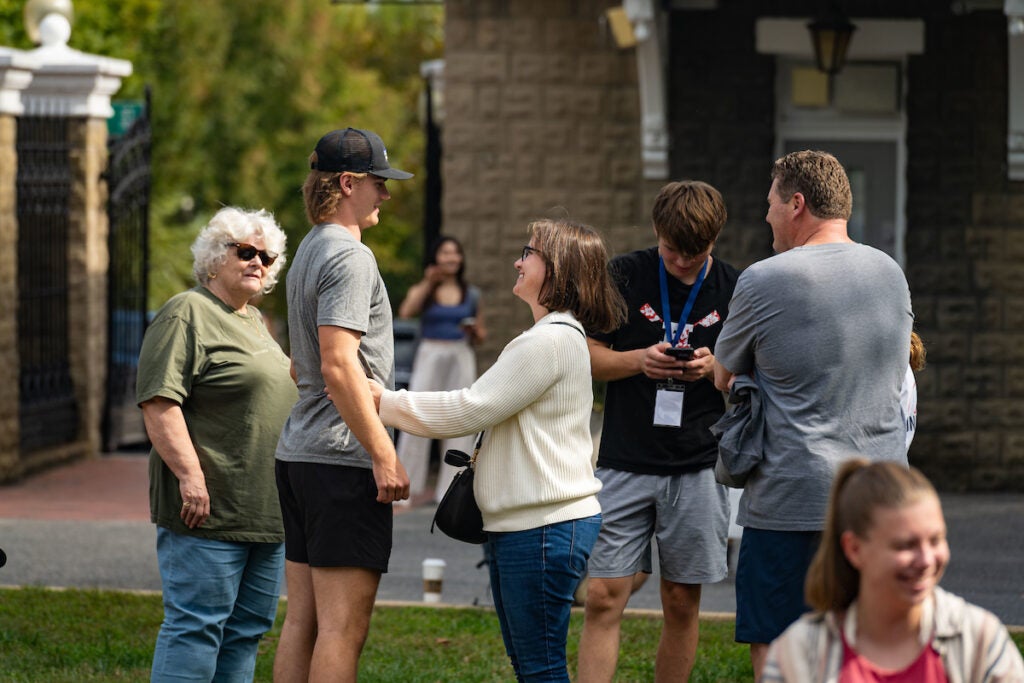How Families Can Best Support Their Student in the College
Welcome to the College of Arts & Sciences!
We are excited to get to know your student and to support them as they engage in academic life at Georgetown. Thank you for helping them arrive here, and thank you for continuing to support them as you prepare to depart and travel home. Below you will find our Dean’s Office advice and additional resources to help you support your student’s intellectual journey at Georgetown.

Top Four Tips to Be Supportive Hoya Families
Tip 1: Help your student be a problem solver.
When your student calls home with an academic problem, the natural temptation may be to intervene. Take a breath and remember that your student will benefit from learning to solve their own problems. They will benefit from your expressed support, but also from the freedom and time to find solutions themselves, and from the confidence you show in their ability to do so. Some supportive questions you might ask them: have you talked to your dean about this issue?; have you talked to your professor about the issue?; have you explored any resources on campus, like tutoring?
Tip 2: Help your student see beyond the problem.
Academic issues often reflect other kinds of problems, like poor sleep or nutrition, social stressors such as relationship issues, mental health, family challenges, and more. You may be better than anyone at detecting this in your student. As such, encourage your student to think about holistic health and about self care. University of Chicago’s Ada Palmer says it well when she writes “self care is an academic responsibility (see link below).” Point them to resources at Georgetown that can support them-such as our CAPS Office, Campus Ministry, Student Outreach and Support Office, Center for Multicultural Equity and Access, Office of Student Financial Services, and Academic Resource Center.
Tip 3: Help your student ask whether it’s a problem at all.
While some academic difficulty can reveal underlying problems worth addressing, some difficulty may simply be the expected discomfort when we grow and change. We promote and celebrate exploration and reflection, both of which can lead to new interests, new realizations, big changes; these crossroads can feel, in the moment, like crises. In truth, they may just be the head catching up to the heart. Help your student celebrate the new if they’re inclined to fret about a mounting challenge or mourn a fading plan. Your student may feel overwhelmed because the new material is difficult or because their first grades aren’t all A’s (this is normal). Emphasize that learning is a process, that a college experience free of challenges is probably not living up to its promises, and that there’s even much to learn from failing. Join us in our efforts to support and accompany your student through these anxieties, to uncover hidden victories along the way, and to embrace a certain degree of discomfort or of struggle.
Tip 4: Trust.
College is about self-discovery and Georgetown supports students in this process in many important ways. This is also a difficult process and can be made more difficult when students feel that the opinions of people they love and trust are causing them to second-guess their own. Trust that they will find their way, that we are here to support them in doing so, and try and help them let their interior serve as their guide.
Resources for You and Your Student

- GU Parents & Families Website: On Georgetown University’s web page for Parents & Families, you can find conversation starters for important topics as well as help connecting with Campus offices and resources.
- Healthy Academic Work Habits: This article, which was published by University of Chicago’s Ada Palmer during earlier days of the pandemic, remains a valuable resource, full of good advice around healthy academic work habits .
- Georgetown College Dean’s Office Advising Team can be found here.
- Campus Ministry and its ESCAPE weekend retreats
- Professor Matt Carnes’ Bothered Excellence article